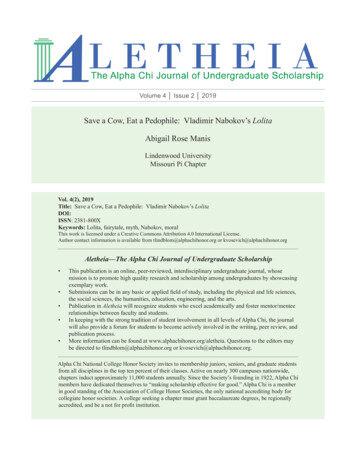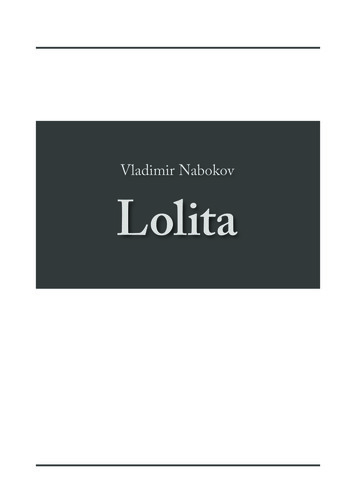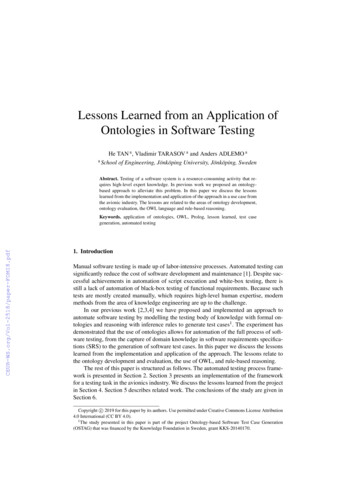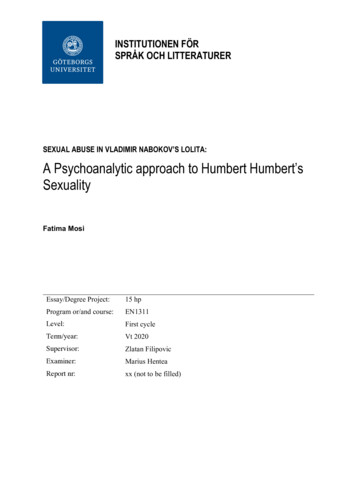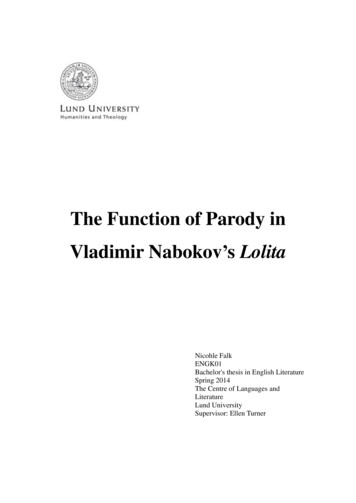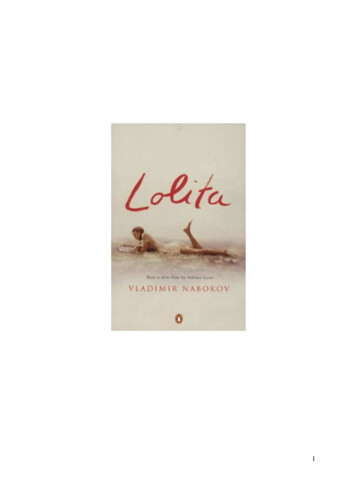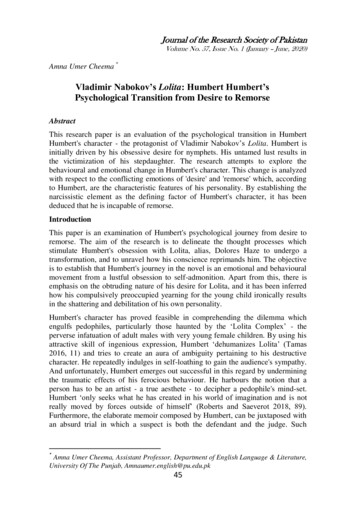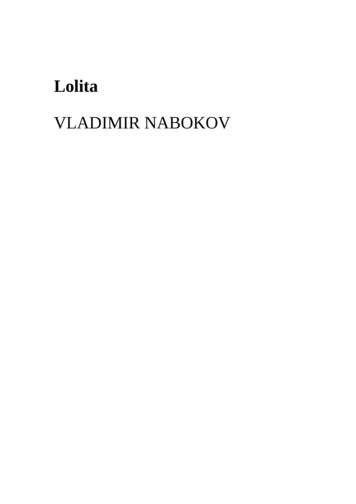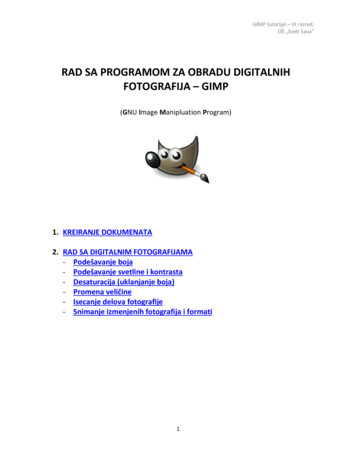
Transcription
“Lovely, Trustful, Dreamy, Enormous”: Vladimir Nabokov’sRepresentations of America in LolitaAn Honors Paper for the Department of EnglishBy Tully Patrick MoyerBowdoin College, 2018Ó2018 Tully Moyer
Table of ContentsAcknowledgements iiiIntroduction . . . 1Not-so-separate Spheres: Privacy and Publicity in American Hotels and Motels. . . . 9Humbert the Persuader: Contradictory Criticisms of American Consumerism . . . 50Connection to Place: Seeking an American Identity . . . 98Coda . . . .138Works Cited . .141ii
AcknowledgementsThank you to Professor Morten Hansen, my advisor on this project, for reading countless drafts,providing honest and productive feedback, and taking the time to talk about things at every stepalong the way. And of course, thank you for your guidance throughout my time in the BowdoinEnglish department, from my first year until now, constantly believing I can do better andshowing me how to get there.Thank you to my readers, Professor Meredith McCarroll and Professor Hilary Thompson, foryour thoughtful consideration and comments throughout the year. I appreciate your uniqueperspectives that have challenged me to think about my work in entirely new ways.Thank you to Professor Celeste Goodridge, for your years of service to Bowdoin College and theimmeasurable impact that you had on the lives of so many Bowdoin students. Beginning with myfirst college English course, your passion and brilliance inspired me to think about the Englishlanguage and my time as a student in an entirely different way. I have always valued the timethat you took, long after your role as my professor ended, to care for my education and life moregenerally, and all of my future intellectual pursuits will be shaped in a significant way by mytime with you.iii
IntroductionIn an interview for Playboy Magazine, Alvin Toffler once asked Vladimir Nabokovwhich of his books was the most difficult to write, and Nabokov responded:Oh, Lolita, naturally. I lacked the necessary information—that was the initialdifficulty. I did not know any American 12-year-old girls, and I did not knowAmerica; I had to invent America and Lolita. It had taken me some 40 years toinvent Russia and Western Europe, and now I was faced by a similar task, with alesser amount of time at my disposal. (Toffler)Nabokov invites us to look closely at the choices that he makes with everything from the motelsthat Humbert Humbert and Lolita Haze stay in during their travels to the jobs with whichHumbert occupies himself when he first arrives in America. The question of exactly howNabokov invented his version of America requires looking at Nabokov’s history in the countryand the ways in which he represents America in the novel. Important to Nabokov’s time inAmerica is the fact that he had no real, permanent home. Some of his time was spent in towns inwhich he taught at universities and colleges, but much of his time was spent on the road,travelling with Véra and Dmitri (his wife and son), jumping between motels and cabins whiledriving across and discovering America. This travel proved critical to the development of Lolita,as he began to learn about the regional differences and formed a more complete vision of thecountry. This vision comes through in many forms throughout the novel—places, people, stores,towns, interactions and institutions, to name a few—and in this work, I focus on Nabokov’svision of America as it is revealed through his discussion of privacy in American motels,1
capitalism and American consumer culture, and the relationship between space and place inAmerica as it relates to travel and automobiles. While these topics together fall short of acomplete survey of Nabokov’s vision and views of America, they each contribute somethingunique to the broader system of ideals that defines American life and culture.As Nabokov’s vision of America begins to take shape through Humbert’s narrative,Nabokov highlights emerging paradoxes of American culture. Through his discourse on privacy,consumerism, and place in the novel, the role of the individual within the broader picture ofsociety becomes increasingly important. Scholars in a wide array of fields have commented onthe role of individualism in America. One such example is Robin M. Williams, Jr.’s AmericanSociety, which approaches the topic from a sociological angle, highlighting the Americanemphasis on “individual personality rather than group identity and responsibility” (442). This isnot to suggest that Americans adopt a “lone wolf” mentality, but rather that they enjoy a certainamount of autonomy. Williams adds, “So long as American society safeguards the right of theindividual to a wide range of moral autonomy in decision making, so long as the representativecharacter structure of the culture retains a conscience that is more than simple groupconformity—so long will freedom be a major value” (421-422). Williams recognizes theimportance of individual autonomy in preserving the American value of freedom, and thisrelationship between individualism and freedom plays a critical role in Humbert’s narrative. AsHumbert soon finds as he moves to America and gets to know his new country, societal normsand institutions protect individual rights, but at the same time, lack of privacy, conformistattitudes surrounding mass culture and blending ideas of place often reject the individuality thatAmericans value. In Lolita, Nabokov highlights many of these conflicts, and more importantly,2
he uses Humbert’s experiences to explore the ways in which an individual of foreign origin isable to find his place in American society—both as an individual and a part of a larger group.In formulating my argument, I use three main categories of secondary sources. First, I useliterary scholarship dealing directly with Lolita and Nabokov throughout, and these serve toconnect other theoretical works to the novel and to point to valuable questions and complexitiesof Nabokov’s work. Second, I use biographical sources on Vladimir Nabokov, his past beforecoming to America, his experiences in the country and his process of writing Lolita. Because alarge part of my argument involves drawing connections between Nabokov’s experiences andHumbert’s narrative, this biographical framework serves a critical role in providing details ofNabokov’s past.1 Lastly, I use sources that deal directly with the topics of interest in thisproject—privacy, advertising and consumerism, and place and travel—but are not immediatelyconnected to Lolita or literature at all, in many cases. In the first chapter, on privacy, I relyheavily on legal sources, analyzing the ways in which court decisions and histories of privacy inAmerica reveal details about the ways in which privacy was understood in the 1950s and today.In the second chapter, I use narratives and studies of advertising and consumer culture inAmerica in the 1950s that approach the topic through economic and social lenses, which allowsme to place Lolita and Nabokov’s ideas within an historical context. I also utilize theoreticalunderstandings and definitions of mass culture and the culture industry, which help to explainmany of Humbert’s feelings about American culture in his narrative. In the third chapter, I usestudies of the relationship between space and place to explore Humbert’s sentiment towards1Nabokov’s own effort to document his travels, along with his time spent at universities in the East, resulted in agreat amount of information available about his life. The works of Brian Boyd and Robert Roper were especiallyhelpful with this.3
place and his connection to America. These secondary sources from other fields help to connectmy ideas to existing scholarship on Lolita and Nabokov.Beginning with their very first night together after Charlotte Haze’s death, Humbert andLolita spend most of their nights in hotels and motels. I begin this project by analyzing the roleof hotels and motels in Humbert’s narrative, specifically as they relate to the idea of privacy.Privacy is a difficult word to define, as it can mean various things in different contexts, and inthe first chapter, I outline the ways in which privacy is viewed by Humbert and Nabokov.Importantly, this complexity is exactly what makes the topic of privacy in America so interestingto Nabokov. He does not use Lolita to criticize or celebrate privacy’s functioning in Americansociety, but rather to explore the ways in which private and public spheres function and overlap.Humbert has very specific goals for his privacy, as he relies on it to protect his relationship withLolita, both in keeping their relationship away from the public eye and in his employment ofprivacy as a defense of his criminal actions. As Humbert’s vision of privacy develops, a clearerpicture emerges of the relationship between public and private spheres in America. Humbertconstantly seeks private spaces in which he is able to be alone with Lolita, but these spaces areseldom as private as he imagined, as other guests and hotel employees threaten Humbert’ssecrecy. Even in this incomplete privacy, though, Humbert is still able to engage in sexual actswith Lolita, and in this way, he violates the sanctity of private spheres that Americans have triedso hard to protect. Through Lolita, Nabokov also creates a space in which readers are able toexplore their own relationship with privacy in the context of a novel. Nabokov’s aestheticizedprose welcomes the reader into their own private space, where they are able to form their ownideas about publicity and privacy, and then proceeds to intrude upon that newly created privatesphere by describing the ways in which Humbert takes advantage of private spaces in the novel.4
In doing so, Nabokov develops a discourse on the relationship between public and privatespheres, challenging traditional understandings of privacy and allowing the reader to consider thekinds of spaces that should or should not be protected by society and government.This American value of privacy returns to liberal values that allow individuals to maketheir own choices. Humbert uses the idea of privacy to argue that he and Lolita are each able tomake their own conscious decision to engage in these sexual acts, but this freedom of choice inAmerica also extends to its capitalist economy that allows consumers to choose how to spendtheir money. Nabokov’s representation of American consumer culture in Lolita is complicatedby Humbert’s involvement in the advertising industry. He first comes to America to work for hisuncle’s business, focusing on advertisements for perfumes. Through Humbert’s work, and itseffects on his life afterwards, Nabokov explores the relationship between consumer andpersuader. While Nabokov celebrates some aspects of this consumerism, he is also critical ofmany of the tactics used by persuaders, like the exploitation of vulnerable targets or misleadingadvertisements. At the same time that Humbert engages with the role of persuader through hiswork, he is also critical of consumers, taking special interest in Lolita and her mother’sobsessions with American mass culture. Throughout Humbert’s cross-country travels, hecelebrates the diversity of landscape in America and comes to appreciate the value ofindividualism, but he is critical of those that reject this individualism in favor of conformity.Humbert quickly adopts a classist attitude towards Lolita’s preferences and sharply criticizesAmerican mass culture and consumerism, seeing it as a low form of culture that strips Americaof its focus on the individual. As he becomes increasingly critical of Lolita’s participation inAmerican consumerism, Humbert also begins to commodify Lolita and become the exact kind ofconsumer that he sharply criticizes throughout his narrative. In the second chapter, I argue that5
through advertising and Humbert’s relationship with Lolita, Nabokov exposes the deceit andexploitation that stem from the self-interest of consumers and persuaders in American consumerculture in the 1950s. Parallel to this narrative is the development of a national identity inAmerica after World War II. The clash of New Deal policies with the American rejection andfear of communism revealed uncertainties about the general American stance on capitalism, andsimultaneously, Humbert is trying to find his own identity in America as a consumer andpersuader, and as a European emigrant.As Nabokov makes these general commentaries and critiques of America and Americanculture, he examines the country as a whole, but he also considers his own relationship withAmerica as he begins to view it as his home. Because of his nomadic lifestyle, there was no oneplace in America that he was able to consider his home, but he still felt deep ties to the country,and he explores this relationship through Humbert’s travels with Lolita. Nabokov, throughHumbert’s narrative, makes key distinctions between space and place, and this relationshipbecomes increasingly understood by Humbert as his narrative progresses. In an effort to keepsecret his relationship with Lolita, he brings her on the road, never staying in one place for toolong. I argue in the third chapter that Humbert’s staying in one place results in the establishmentof meaning and sense of place, and that while this is what he craves, he also recognizes thedisastrous effects such an establishment would have on his relationship with Lolita, and it is thishe tries to avoid by keeping her on the road. While this exposes him to new areas of the country,and eventually he comes to appreciate the beauty that he finds through his travels, this movementleads to regret. I argue that he detests the emptiness with which he views America, but that histravels by automobile allow him to experience the country for all of its distinctiveness.Importantly, Humbert recognizes his love for America, but he also notes that he only arrives at6
that love after a sustained period of disdain and lack of understanding. This shift from his viewof America as “no more than a collection of dog-eared maps, ruined tour books, old tires” tohis eventual understanding of “the lovely, trustful, dreamy, enormous country” is more easilyunderstood by considering the ways in which spaces differ from places. An emotional attachmentto a place requires some understanding of the ways in which that place differs from other places,and it is this individualism of place that Humbert eventually identifies and comes to love.Critical to the vision of America put forth in Lolita is its existence as a departure fromlife in Europe, for both Nabokov and Humbert. Each having spent their formative years inEurope, America represents a change in their life—away from something old and towardssomething different. They have their unique motivations for coming to America, but as theysettle and come to know the country, they have similar feelings and troubles with regard to theirnew space. Through Lolita, Nabokov explores his own feelings about America by showing thecountry as he sees it. The vision presented is certainly not an outright embrace of America andall of its values, but nor is it an outright rejection. At times, he criticizes the country and itspeople through humor or ugliness, and in other moments, he showcases its beauty. In thisproject, I do not attempt to determine Nabokov’s true feelings; instead, I will analyze some ofNabokov’s own internal debates that he puts into text through Lolita and explore thecontradictions and complications that he writes into Humbert’s narrative. In Lolita, Humbert as aEuropean emigrant is forced to develop his identity as an American, and he—and alsoNabokov—eventually sees himself as one. By exploring Humbert’s development of an Americanidentity, Nabokov reveals his own vision of America and American people. While Humbert’sAmerican identity and the identity of the country itself are not identical, this is exactly whatHumbert enjoys—the immense value of individualism and personal autonomy. His criticisms7
deal mostly with conformity and group behavior, but while he sees these as prevalent inAmerican society, he does not suggest that they shape the nation’s character. Rather, it is theways in which American society allows individuals to break free from this conformity thatshapes American identity and individuals’ roles within society.8
Chapter OneNot-so-separate Spheres: Privacy and Publicity in American Hotels and MotelsIt is impossible to read Vladimir Nabokov’s Lolita without considering the moralproblem of Humbert Humbert’s pedophilic relationship with Lolita, and scholarship around thenovel reflects the varying arguments about how morality should be viewed in the context of thenovel.2 Equally as obvious in the text are the legal implications of Humbert’s pedophilia andmurder of Clare Quilty. Perhaps because of Humbert’s obvious guilt—in fact, the entire narrativeis written as a confession—the craft of his argument is often left undiscussed. Humbert is soaware (and perhaps even proud) of his guilt that he wastes no time trying to claim that he did nothave sex with Lolita or kill Quilty. Instead, he makes the nuanced argument that he was seducedby Lolita, and great memories of his past allowed him to follow through on her advances. This isnot to say that he does not believe his sexual relationship with Lolita was criminal, but that hehopes for sympathy and understanding as he makes his plea. He makes the argument that hiskilling Quilty was a crime of passion, but this necessitates a defense of his pedophilia, in somemanner. For this tall order, Humbert argues that privacy protects his relationship, and it is onlywhen this privacy is violated that it is exposed to the public. He revels in the privacy that he isable to find. He laments when others prevent him from doing so. He has clear ideas about whatprivacy means and how he should be able to find it. However, these ideas are constantly beingdisrupted and challenged. While the narrative develops distinctions between private and public2Frederick Whiting in “‘The Strange Particularity of the Lover’s Preference’: Pedophilia, Pornography, and theAnatomy of Monstrosity in Lolita” and Martin Green in “The Morality of Lolita” are just two examples of the manyscholars that approach the topic of morality in Lolita.9
spaces in the novel, these commentaries have real world implications for the reader. In thischapter I will discuss the private space created for the reader by Nabokov and his followingintrusions into that same space. At the same time that Nabokov explores the relationship betweenprivacy and publicity through Humbert’s narrative, Nabokov exposes the reader to thecontemporary discourse on privacy and creates a space in which the reader is able to considerhow these public and private spheres function in the world.For Humbert, privacy is about isolation, but imagining his ideas on the topic with just thisword is problematic. His vision of privacy is dynamic; the way he imagines private spaces beforehe engages in his relationship with Lolita is far different from the way he imagines it towards theend of his narrative, when he kills Quilty. While Humbert writes about his hopes for a privatespace to be alone with Lolita and believes that only complete privacy will allow him to maintainsecrecy with their relationship, he is still able to find the positive effects of privacy that he needs,even in the absence of total privacy. As the narrative develops, a clearer picture emerges aboutthe goals and effects of private spaces and how these are complicated by the various uses ofprivacy. In this chapter, I will analyze the complex relationship between privacy and public viewthat Humbert and Nabokov struggle to resolve in Lolita. By describing Humbert’s use of privatespaces for illicit means and his arguments for increased protection of those private spheres,Nabokov challenges traditional understandings of public and private spheres and explores theways in which society should or should not protect those spaces.In order to analyze the ways in which American ideas on privacy relate to Lolita, I turn tolegal texts, such as court decisions and histories of privacy, as these sources allow me to explainthe understandings of privacy in America that inform Nabokov and Humbert’s views. BecauseHumbert frames his narrative as a legal defense, these legal sources provide key insights that are10
not often found in literary scholarship. Literary scholarship is still critical to my work in thischapter, though, as scholars like Brandon Centerwell and Frederick Whiting have done importantwork to connect the reader to the text of the novel, and I use these sources to explain the ways inwhich the reader and the novel are situated within the broader discourse of privacy in America. Ialso use David Rosen and Aaron Santesso’s The Watchmen in Pieces, which analyzes the waysin which privacy and individual autonomy function in literature. While this work does not dealdirectly with Lolita, it is still useful as I connect literary and legal scholarship.Inside the Mind of the Reader: Morality and AnxietyNabokov elicits an emotional response in readers through Humbert’s invasions intotraditionally private spaces, and it is through this invasion that Nabokov challenges readers toconsider the implications of understandings of privacy in Lolita. Frederick Whiting, in “‘TheStrange Particularity of the Lover’s Preference’: Pedophilia, Pornography, and the Anatomy ofMonstrosity in Lolita,” notes the complications involved with trying to assess moral commentarysurrounding sexuality in Lolita: “ the novel neither evades the ethical implications ofHumbert's monstrous desire nor reiterates a shopworn outrage at his deeds but questions theperiod's conceptions of monstrosity and ordinary subjectivity, privacy and publicity, aestheticsand morality, upon which any ethics must ultimately depend” (Whiting 835). Although Nabokovneither sympathizes with Humbert’s sexual desires nor explicitly denounces them, hisrepresentation of Humbert and Lolita’s relationship still must be understood within a broadersocial context. Whiting argues that “both types of monster, the pedophile and the pornographer,tapped into a nexus of postwar social and political anxieties about normal, heterosexual, male11
subjectivity and its place within the organization of public and private life” (834). These postwartensions are important to understand, as they blur the line between public and private life.“Humbert the pedophile,” Whiting argues, “threatened the home, innermost bastion of privacyand last redoubt guarding liberal democratic freedoms” (834). Humbert engages in illicit sexualacts with Lolita in private spaces, and Nabokov brings these invasions to our attention. Byexposing Humbert’s threats to intimate, private spaces, Nabokov brings these actions to thepublic sphere, making others aware of these threats to “democratic freedoms.” The home is seenat this time as the ultimate private space, where children (which Whiting calls the “veryembodiment of privacy”) are protected from the outside world (834). Thus, as Nabokovthreatens this privacy through the exploitation of a child, the private world becomes increasinglyvulnerable. The will of the public to protect these spaces leads to a territorial battle for privatespaces between the public and those that threaten the private—in this case, pedophiles.Humbert recognizes the existence of separate spheres for adults and children andexpresses anxieties about the increasing disconnect between these two worlds: “The whole pointis that the old link between the adult world and the child world has been completely severednowadays by new customs and new laws” (124). As Humbert attempts to claim legitimacy in hisrelationship with Lolita, he argues that it is only in modern times that customs and laws havecome between adults and children.3 It is this disconnect that he attempts to blame for his demise:Human beings, attend! I should have understood that Lolita had already proved tobe something quite different from innocent Annabel, and that the nymphean evilbreathing through every pore of the fey child that I had prepared for my secretdelectation, would make the secrecy impossible, and the delectation lethal. I3Humbert adds, “Despite my having dabbled in psychiatry and social work, I really knew very little about children”(124).12
should have known (by the signs made to me by something in Lolita—the realchild Lolita or some haggard angel behind her back) that nothing but pain andhorror would result from the expected rapture. Oh, winged gentlemen of the jury!(125)Humbert appeals to “human beings” and “gentlemen of the jury” in order to defend hisinnocence. His claim here attempts to shift the blame away from himself and onto Lolita.Humbert does half-heartedly attribute some of the blame to himself by using phrases like, “Ishould have understood ” or “I should have known ,” but he also argues that it is Lolita andher differences from Annabel that ultimately make the “delectation lethal.” He wants hisaudience to understand that it is not his complete inability to understand children that is the issue,but rather Lolita’s differences from Annabel and the changing nature of the relationship betweenchildren and adults.Humbert includes in his appeal a recognition of the importance of innocence and hisattempt, however misguided, to retain that innocence. Central to Frederick Whiting’sunderstanding of postwar anxieties about the home and private spaces is the retention of theinnocence of children. He writes that Humbert’s “victims, children, were the very embodiment ofthat privacy, incarnations of innocence possessing no public existence whatsoever save theircameo appearances in the protective statutes designed to reinscribe them, ever more safely,within the domestic sphere” (834-835). Humbert considers this innocence as he writes of theirfirst night together at The Enchanted Hunters, “I was still firmly resolved to pursue my policy ofsparing her purity by operating only in the stealth of night, only upon a completely anesthetizedlittle nude. Restraint and reverence were still my motto—even if that ‘purity’ had beendamaged through some juvenile erotic experience” (124). Humbert argues here that he has no13
obligation to retain her innocence, as it has already been corrupted by her sexual experiences atcamp, but even in the absence of such an obligation he still seeks to retain her purity. He arguesthat he is keeping her safely within the private, domestic sphere, while at the same time arguingthat she is not a normal child and has already been removed from that sphere. Importantly,however, Humbert ultimately abandons this attempt to retain Lolita’s innocence when they firstengage in sexual relations the next morning, unanesthetized. Humbert’s intrusion into theprivate, domestic sphere accounts for anxieties surrounding his and Lolita’s relationship, as it isseen as an attack on liberal democratic freedoms. His public appeal for his innocence then can beviewed as a defense of his place within the private sphere and his right to utilize private spacesfor what he sees as legitimate uses. While others view Humbert’s actions as an attack on liberaldemocratic freedoms, Humbert views society’s intrusion into his private life as an attack on hisown liberal democratic freedoms. These different understandings allow the reader to consider theextent to which certain spaces should be considered private and to what degree those spacesshould be legally protected.4While considering the psyche of the reader and their reaction to Humbert’s narrative, it isimportant to also take into account Humbert’s motivations. Because the narrative is entirelyHumbert’s and thus free from censorship or corrections, the narrator is not entirely reliable.When Humbert complains about not being afforded privacy, this feels like a good thing, as apedophile is prevented from engaging in sexual acts with a child. On the other hand, Humbertmakes persuasive arguments about privacy being an American value that should be taken4Whiting adds that during the Cold War, these “monstrous” forces that threatened the home began to shift fromvisible to invisible, increasing anxieties surrounding these threats (836). This shift is critical to Humbert’s narrative,as he makes public his destructive actions that are made possible by the existence of private spaces. Private,domestic spaces that once provided a haven from these monsters serve in Lolita as spaces in which these monstersare able to hide.14
seriously. This tension requires careful thought on the part of the reader about the impression thatHumbert is trying to make and his motivations backing his writing. David Rosen and AaronSantesso write in The Watchmen in Pieces, “Control of any situation is inevitably complicatedby the arts of impression management: a person must meet expectations but give no sign ofcalculation: his or her audience, in turn, must watch constantly for insincerity” (57). Humbertknows, or at least thinks that, he is under constant watch, and as a result, his activity becomes aform of performance as he seeks to deceive those by whom he is being watched.5 A criticalfactor brought forward by Rosen and Santesso is calculation. As I will discuss more in thesecond chapter, Humbert is constantly practicing the art of persuasion, and this makes it all tooeasy to take his words at face value. In response to Humbert’s calculations, the reader must“watch constantly for insincerity.” While it is obvious to anyone reading Lolita that Humbert’spedophilia is morally and legally wrong and should be punished appropriately, the questionsabout privacy and where it should and should not b
In an interview for Playboy Magazine, Alvin Toffler once asked Vladimir Nabokov which of his books was the most difficult to write, and Nabokov responded: Oh, Lolita, naturally. I lacked the necessary information—that was the initial . Lolita, both in keeping their relationship away from the public eye and in his employment of

